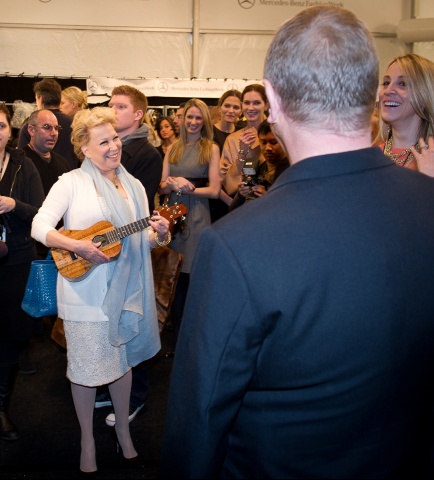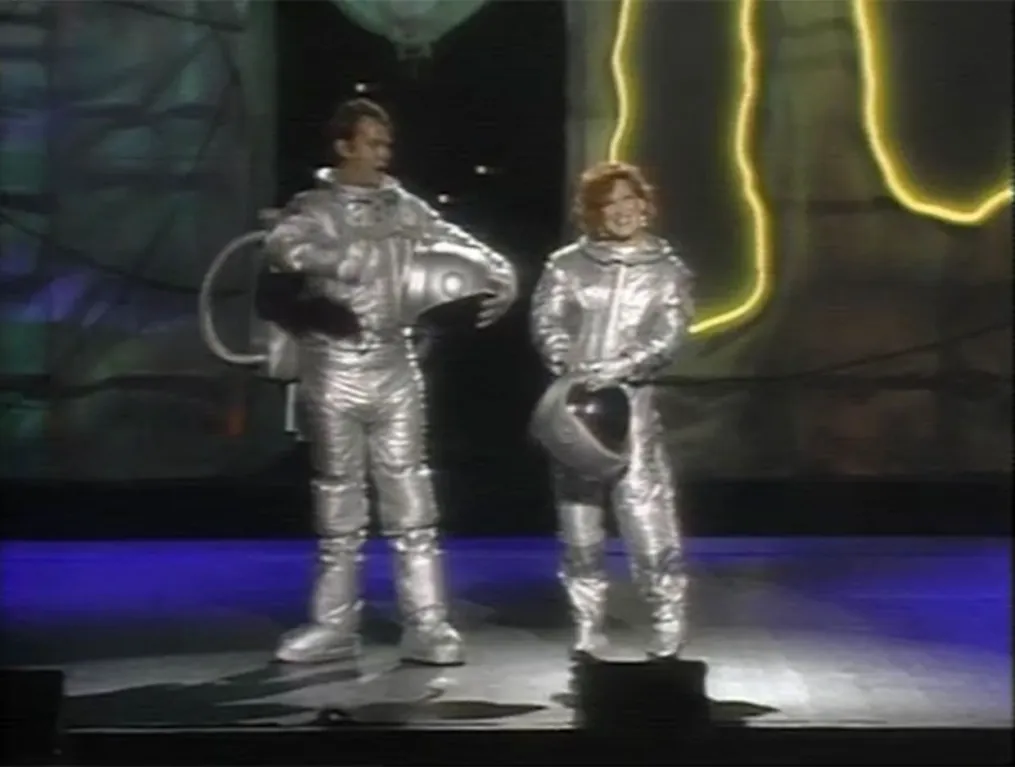December 5, 2003 —
From NYP.com
By DAN AQUILANTE
For Barry Manilow, it’s a cultural tradition.
“Irving Berlin was a super-Jew, and he composed the greatest Christmas song ever. Berlin wrote ‘White Christmas’ and the whole world embraced it,” Manilow told The Post from rehearsals for tonight’s broadcast of A&E’s “A Barry Manilow Christmas: Live By Request.”
“Christmas isn’t about the religion for me. The holiday season is about joy, togetherness and family. That’s why the season moves me,” he said.
Manilow, 57, may not have written the Noel melodies, but he recorded two best-selling holiday albums – and he isn’t concerned that any viewer’s request can stump him.
Whatever happens tonight will be easy compared with the past roller-coaster year, one of the busiest in Manilow’s life.
He rekindled his friendship with Bette Midler during their collaboration of “Bette Sings the Rosemary Clooney Songbook,” he fractured his famous aquiline proboscis, he learned the pain and pleasure of creating a Broadway musical, and next Thursday he has a cameo on the hit TV comedy “Will and Grace.”
“I’m in the last scene. The whole show is based on Will trying to get a ticket to one of my concerts. I won’t tell you my lines, but the scene takes place in my tour bus and we end up singing ‘It’s a Miracle.’ ”
Manilow is easy to talk to. He’s passionate about music and seems to want to have fun, even if that means poking a little fun at himself. When called a pop-culture icon, he dismisses the notion, saying, “If you live long enough, anything can happen.”
Post: You and Bette Midler hadn’t worked together in 30 years and suddenly you guys have a gold record. How did it come about?
Manilow: It started last January. I was in bed and I woke up suddenly from a dream where Bette and I got back together for Rosemary Clooney. I called Bette and told her.
Post: How did she react?
Manilow: Rosemary Clooney was a friend to both of us and we admired her. Bette liked it. I told her I was going to do all the arrangements and set everything up and all she had to do was come into the studio for two days and sing. That’s it.
Post: Instant album, just add Midler. You wake up with an idea and then just do it?
Manilow: All of my successes have come out of dreams. The melody for “When October Goes” came out of a dream. I’ve had ideas for arrangements, for dialogue, for whole albums come out of dreams. When I’m asleep, my editor is off.
Post: After all these years, did you notice changes in Bette and you?
Manilow: Bette is deeper. She uses her life experience in her singing. She isn’t as rebellious and out of control as she was . . . she’s more mature and it’s really beautiful. I’m more mature, too. Over the years, we’ve always been friendly, but we became friends again with this project.
Post: You’ve said you don’t think of yourself as a performer. What are you?
Manilow: On my passport, where it says occupation, it says, “musician.” I think of myself as a musician; the rest was lucky breaks and a lot of work. The musician part came naturally.
Post: I’m going to say a name and a song title. Clive Davis and “Mandy.”
Manilow: The Clive Davis/”Mandy” thing was a beautiful, lucky accident for me. I’ll never be able to thank him enough for spotting my performing talent. I never saw it in me. I didn’t know what he was talking about. I was a writer, a musician, and he said, “No, you’re a performer.” I didn’t believe him, but I’m glad I listened.
Post: Clive is never wrong.
Manilow: I call him NostroDavis. He really can see into the future.
Post: This summer you did the klutziest thing a guy can do.
Manilow: What are you talking about . . . you mean when I walked into the wall?
Post: That’s it.
Manilow: It was because I stay in too many hotel rooms and I’m always away from home. I was staying in Malibu. I woke up and had to pee. In Malibu, the bathroom is on the right; at my place in Palm Springs, it’s on the left. I took a left and walked into a wall. It’s lucky I didn’t pee in the closet.
Post: Your nose hit first.
Manilow: Bang. I saw stars. It pushed me back onto the bed. I knew I did something bad.
Post: Did you get medical help?
Manilow: When I went to the doctor, he took an X-ray and there was a fracture, but it wasn’t as if Muhammad Ali hit me. I did get black and blue under my eyes. My nose looks the same. I didn’t ruin it. I’d never change it and I never had a problem with it. Like my grandmother used to say, “It’s my chosen nose.”
Post: Late last month, your Broadway production, “Harmony,” was shut down in rehearsals – not because it was a stinker, but because a producer ran out of money. You said it was the worse thing that had happened to you since the death of your mom.
Manilow: Right. I still feel that way, but I feel more emboldened because of the unbelievable support of the Broadway community and the public. I’ve never experienced anything quite like this. As time passes, I know we’re getting back on track with the project.
Post: You’re a very wealthy man. Why didn’t you just write a check?
Manilow: The creator never, ever puts his own money into his own show. You get investors.
Post: Why not break that rule?
Manilow: You don’t. I’m the composer of “Harmony.” I did my job. The producer’s job was to raise money.
Post: Without the money, it’ll never get heard.
Manilow: It’ll be heard. There are people lining up to get “Harmony” back on its feet. As of yesterday, there was a very good possibility that it is going to happen by January. No one in the cast or crew has taken another job yet – they’re all waiting. That’s how confident everyone is. They love this show and know how powerful it is. I don’t get knocked down that easily.
Post: What’s the lesson you’ve learned?
Manilow: To believe in what you do. It was strange. When all this happened, I lost faith in humanity, and then everybody came running to support me. I was overwhelmed. I believe in people again and I’m ready to fight.






